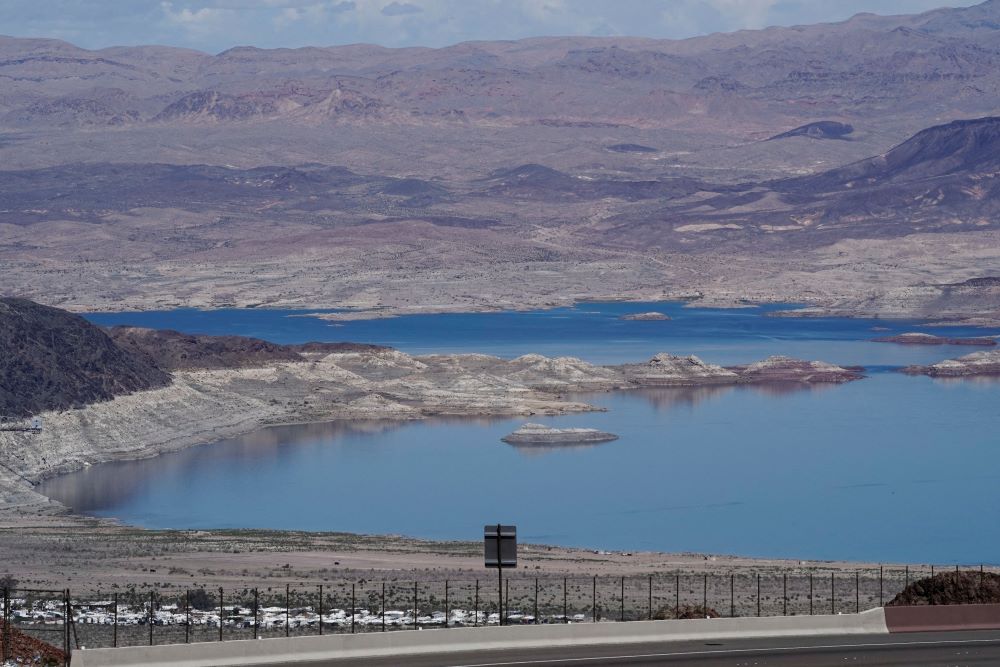
An elevated view shows the dramatic decline of water levels at Lake Mead near Boulder City, Nev., March 13, 2023. A growing demand for water and climate change shrink the Colorado River and endanger a water source millions of Americans depend on. (OSV News/Reuters/Bing Guan)
Editor's note: Following is an address Cardinal Robert McElroy gave to the Jan. 11-13 conference "Lighting the Way Forward: The Purpose of Catholic Higher Education in a Changing World" at the University of San Diego. It is published with permission.
In his epic poem, "Paradise Lost," John Milton captured the majestic drama of the fall and rise of humanity amidst the never-failing love and power of God's presence in the world. In the fourth book of the poem, Satan approaches the Garden of Eden, resolved to bring down Adam and Eve precisely because they have become a focus of God's love and tender care. As he enters the garden, Satan is stunned and overwhelmed by the sheer beauty of the paradise that the Lord has created and bestowed upon the human family.
But where once such overpowering loveliness would have turned his heart to God, now the very beauty of paradise reminds Satan only of his own alienation from the creator, and he despises the majesty of creation, just as he despises its creator. Speaking to the sun, Satan cries out in pain.
O Thou, that with surpassing glory crowned,
Lookest from thy sole dominion like the lord
Of this new world; at whose sight all the stars
Hide their diminished heads, to thee I call,
But with not with friendly voice, and add thy name
O sun, to tell thee how I hate thy beams,
That bring to my remembrance from what state
I fell, how glorious once above thy sphere;
Til pride and worse ambition threw me down.
The lament of Satan is forged by his very estrangement from the world of incomprehensible magnificence which God had created and which Satan had deformed.
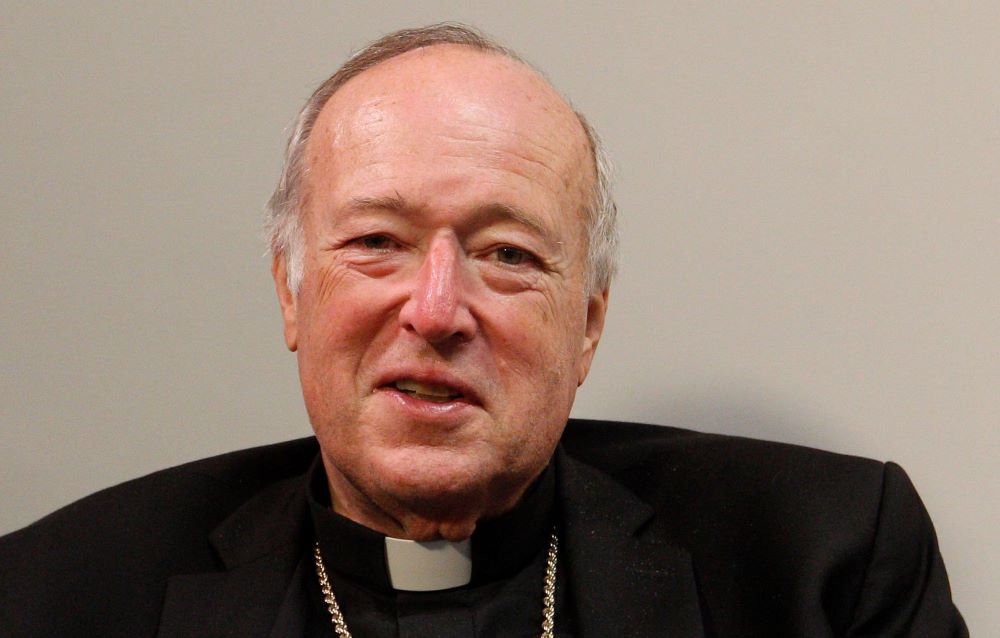
Cardinal Robert McElroy of San Diego is pictured at the Vatican press hall in this Aug. 27, 2022, file photo. (CNS/Carol Glatz)
For us as men and women of the 21st century, this very same estrangement reverberates through our relationship with the earth that is our common home. Perceiving in the recesses of our soul the magnificence of the world that God has created for the entire human family, we yet allow selfishness, denial, the thirst for control, radical individualism and the rejection of God to forge a culture that progressively destroys the beauty and sustainability of the world which is our common home. And in that contradiction, we are estranged from the created order which God bestowed upon the human family as the setting of our pilgrimage on this earth.
Pope Francis' 2015 environmental encyclical Laudato Si' both unmasks this estrangement and points to the pathway forward for us to move from alienation toward healing and the renewal of the earth. The encyclical is a call to arms for those who would rescue our bruised planet from the forces that deplete and destroy it. Climate change and the degradation of the earth are the most important global moral challenge that we face at this moment in our history. For this reason alone, Laudato Si' should be a focus for every Catholic university.
But Laudato Si' is so much more than this. It is a profound call to all women and men to recognize God's personal and loving presence in the wonder of creation. For the Catholic university, which seeks to bring to its students a genuine recognition of the existence and the benevolence of God, Laudato Si' points to the single most universally inviting pathway to encounter with God that exists for the young people whom we are forming in faith and character.
Moreover, Laudato Si' speaks powerfully to the concept of truth which should lie at the center of every Catholic university. In an age when the notion of objective truth is dissipating under the barrage of solipsism and the fracturing special interests in our society and our world, the encyclical points starkly to the dangers of a relativist notion of truth. And that lesson should be part of the aim of every Catholic university.
Laudato Si' brings us into inescapable conversation about the impending moral crisis that has the capacity to deeply and irreversibly cripple the human community of which we are a part.
Third, Laudato Si' beautifully testifies to the principle of solidarity which lies at the heart of Catholic social teaching and is so much under attack in our own nation. In the encyclical, Pope Francis reminds us that the effort to reverse climate change and the degradation of the planet must also include a recognition that the poor and the marginalized suffer most acutely from our rape of the planet. For this reason, an integral ecology that always gives preferential care for those most vulnerable in our world is essential for a truly moral response to the dangers which confront us. Jesus is the model and guide for us in this solidarity, as his unswerving preferential care for all those who were hurting and marginalized makes clear that any Catholic University should seek to instill this very same moral and spiritual stance in the hearts and souls of its students.
In addition, Laudato Si' can be a central pillar of mission and identity for the Catholic university because it speaks piercingly to the moral question of technology and its limits. The university communities of our nation are the seedbeds for the technological revolution that we have witnessed in our lifetimes. The enduring benefits of that revolution surround us and make possible greater human flourishing in areas of medicine, education, economic growth and knowledge. But technology has also generated a series of threats to human flourishing which diminish our humanity and threaten it with annihilation. One of the enduring questions of the Catholic university has been to ponder the question of what limits should be placed on emerging technology in light of the dignity of the human person that lies at the foundation of Catholic social teaching. Engaging with Laudato Si' requires universities and students to grapple with that inescapable moral dilemma which faces us on issues ranging from artificial intelligence to genetic engineering to bioresearch.
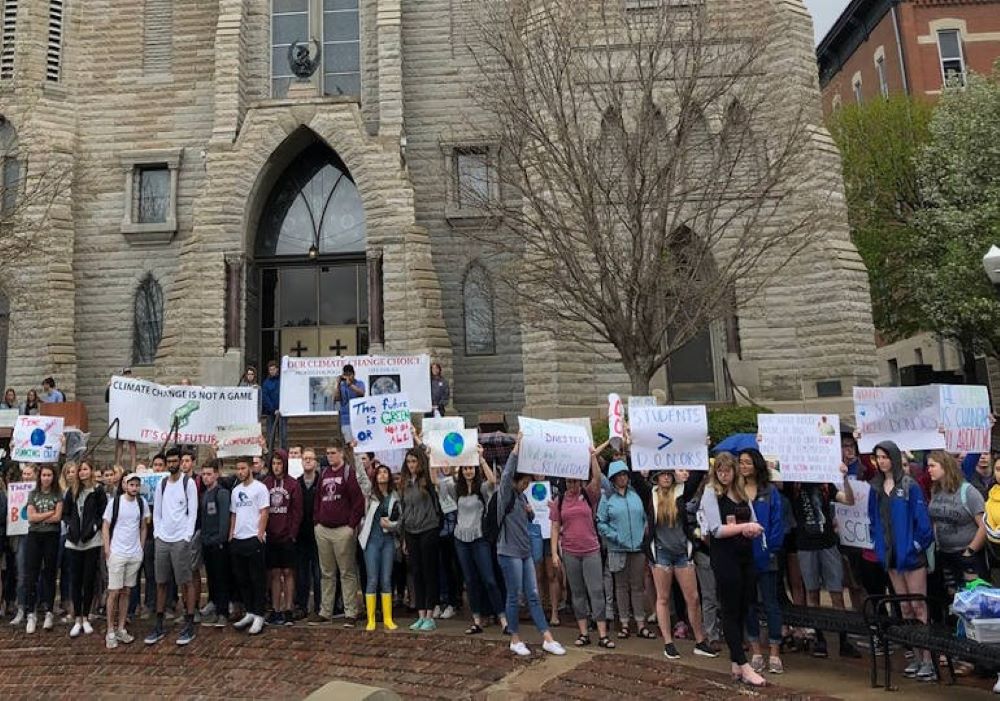
Hundreds of Creighton University students demonstrate in April 2020. pressing the Jesuit school to take increased action on climate change, including divesting its endowment from fossil fuels. In January 2021, the university announced it would phase out all investments in fossil fuels from its $587 million endowment within the next 10 years. (Emily Burke)
Finally, Laudato Si' speaks incisively and powerfully to the ethic of intergenerational solidarity that must suffuse our family life, our culture and our politics. We live in a time in which the fundamental cultural and spiritual recognition that we live on this earth as stewards for the coming generations has been enormously eroded. As a result, our political, societal and personal decisions are increasingly characterized by short-term calculi that transfer the problems of today to the generation of tomorrow. In an issue-area which is particularly appealing to and of import for the young, Laudato Si' invites the coming generation to understand the deep principles of intergenerational solidarity and integrate them into their individual, familial, political and spiritual lives.
The Catholic university is in its essence an act of intergenerational solidarity, sacrificing in the present to build for the future. Laudato Si' can help to make that solidarity vibrant, thoughtful and sustained.
For all these reasons, Laudato Si' constitutes a pillar for advancing the mission and identity of a Catholic University. It brings students into conversation with the enduring questions that Catholic universities have always sought to emphasize: encounter with God; the nature of truth, the relationship of faith and reason; the relationship of technology and morality; the identity of the ethical communities in which we exist as women and men in the world and the solidarity that should unite us all. In addition, Laudato Si' brings us into inescapable conversation about the impending moral crisis that has the capacity to deeply and irreversibly cripple the human community of which we are a part.
Smoke from the American Electric Power's coal-fired Mountaineer Power Plant, along the banks of the Ohio River in New Haven, W.Va., is seen in this file photo. (OSV News/Jim West)
The growing crisis
We stand today at a truly pivotal moment in the imperative to arrest and reverse climate change caused by human action. The yearly reports of the United Nations on the threat of climate change have gauged the increasingly devastating effects of human-produced climate upheaval. The last decade was the hottest on record, with each decade since the l980s hotter than the last. Storms are more severe and severe storms more frequent. The ocean is warming alarmingly, leading to the destruction of the global ice sheets, threatening marine life and coastal communities with rising oceans. With the growth of carbon dioxide in the oceans bringing increased acidity to the seas, the marine life that feeds billions of people is at risk.
More than 3 billion people already live in areas highly susceptible to climate change. Millions of them each year are displaced from their homes because of the increasing level of storms and climate related disasters we are witnessing. Food sources and structures are destroyed. Droughts increase. Hundreds of thousands of people die each year from climate change produced rates of undernutrition, malaria and diarrhea alone. The World Health Organization concludes that "the climate crisis threatens to undo the last 50 years of global progress in development, global health and poverty reduction, and to further widen existing inequalities between and within populations."
In Laudato Si', Pope Francis emphatically recognized the threat posed to humanity by climate change and saw in it a moral failure of the global community.
"The climate is a common good, belonging to all and meant for all," he said. "At the global level, it is a complex system linked to many of the essential conditions for human life. A very solid scientific consensus indicates that we are presently witnessing a disturbing warming of the climatic system."
The effects of climate change, the pope states, are a vicious cycle, bringing increasing levels of harm to communities of men and women across the globe, and always victimizing the poor and the disposed in grotesquely deeper fashion, taking their lives, robbing them of their health, turning them into climate refugees without a home. The pope laments "our lack of response to these tragedies involving our brothers and sisters points to the loss of that sense of responsibility for our fellow men and women upon which all civil society is founded."
But the crisis that Laudato Si' points to is much wider than even the threat of climate change. For it is the broader degradation of the earth which is our common home that is the centerpiece of the encyclical. Following in the footsteps of St. John Paul II, who called for an ecological conversion of all humanity and Pope Benedict, who spurred the church to confront the increasing threat posed by our destruction of the environment in the 20th century, Pope Francis calls for the protection of the earth from the violence being done to it. The destruction of the rainforests, the despoiling of the soil, the diminishment of water resources, the loss of biodiversity caused by indifference and greed. Laudato Si' proclaims boldly: The earth cries out in pain because we are destroying our common home.
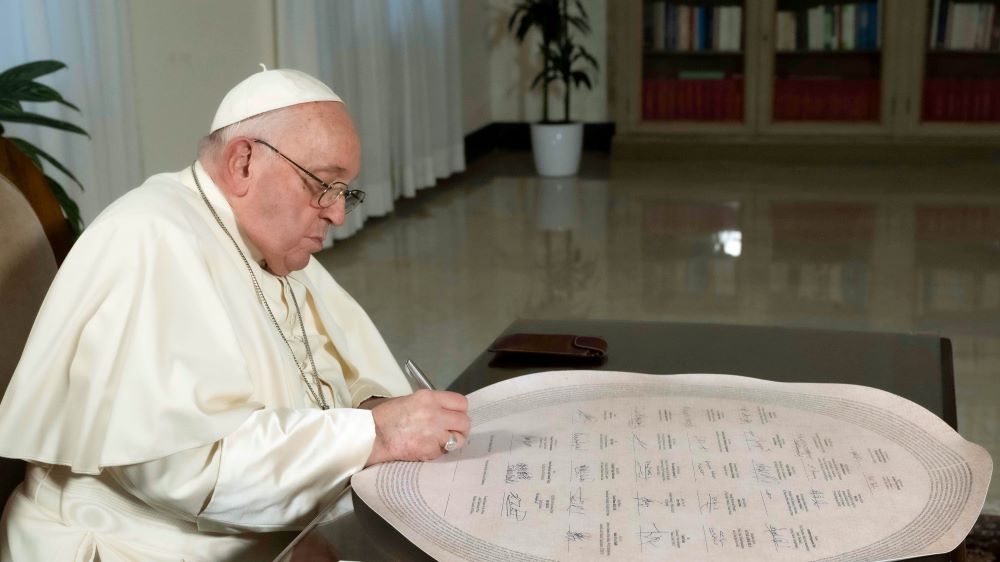
Pope Francis signs the Interfaith Statement on Climate Change in his Vatican residence Dec. 3. The pope had been scheduled to sign the document at the Faith Pavilion at COP28 in Dubai, United Arab Emirates, but was forced to cancel the trip because of a bronchial infection. (CNS/Vatican Media)
Francis concluded:
the urgent challenge to protect our common home includes a concern to bring the whole human family together to seek a sustainable and integral development, for we know that things can change. … I urgently appeal, then, for a new dialogue about how we are shaping the future of our planet. We need a conversation which includes everyone, since the environmental challenge we are undergoing, and its human roots, concern and affect us all. … As the bishops of Southern Africa have stated: "Everyone's talents and involvement are needed to redress the damage caused by human abuse of God's creation." All of us can cooperate as instruments of God for the care of creation, each according to his or her own culture, experience, involvements and talents.
The Catholic universities of the United States can be uniquely effective participants in that cooperation and dialogue, because they blend a concern for the common good and solidarity with the deep and abiding assertion of Catholic faith that creation is deeply graced and must be recognized as such.
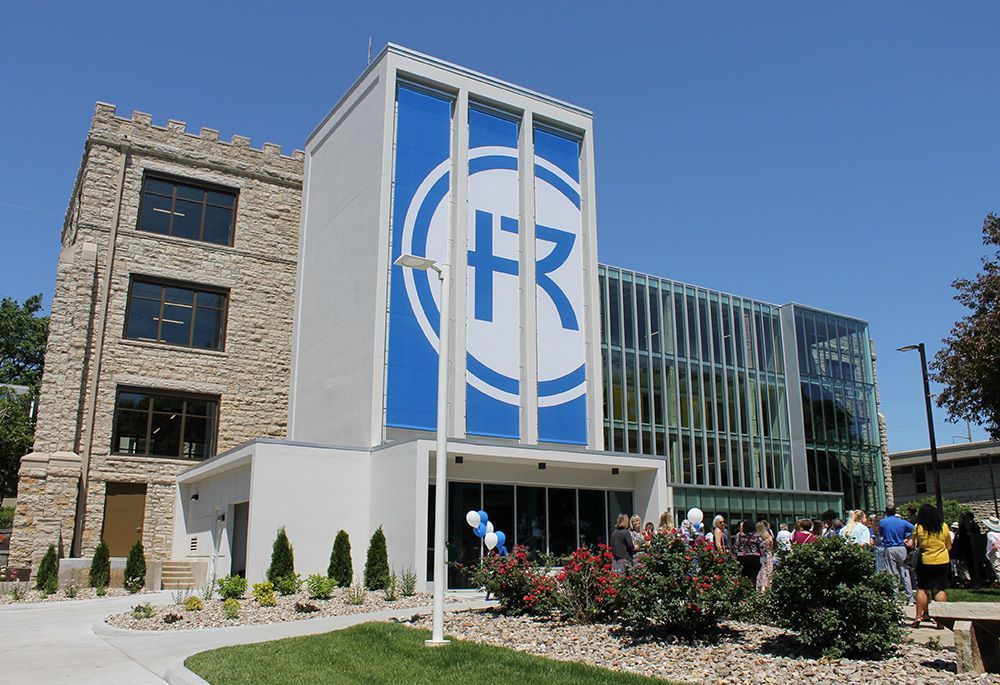
Sedgwick Hall at Rockhurst University, in Kansas City, Missouri, underwent a $23.5 million renovation to transform the building into the new home of the college's nursing school. The multiyear project incorporated numerous sustainability measures, making the century-old structure the most energy efficient building on campus. (NCR photo/Brian Roewe)
This imperative for our Catholic universities to be a major part of the dialogue that Pope Francis has called for has been greatly amplified at this very moment by the agreement reached at the climate conference in Dubai in December. In a striking achievement, the summit embraced a series of options which included transitioning away from fossil fuels in energy systems and contributing to the global goal of tripling renewable energy and doubling energy efficiency. The agreement, with all of its limitations, has the potential to launch the end of the fossil fuel age that threatens our planet.
In his 2023 apostolic exhortation Laudate Deum, which Pope Francis issued on the feast of St. Francis in October, the Holy Father stated that the Dubai summit would either bring a breakthrough in the fight against climate change or else be a capitulation to the forces which obfuscate the challenge that confronts us. He states
We must move beyond the mentality of appearing to be concerned but not having the courage needed to produce substantial changes. We know that at this pace in just a few years we will surpass the maximum recommended limit of 1.5 degrees centigrade and shortly thereafter even reach 3 degrees, with a high risk of arriving at a critical point. Even if we do not reach this point of no return, it is certain that the consequences would be disastrous, and precipitous measures would have to be taken, at enormous cost and with grave and intolerable economic and social effects. Although the measures that we can take now are costly, the cost will be all the more burdensome the longer we wait.
Pope Francis is confronting the church and the world with the evil effects of industrialization in our own day in the same way that Pope Leo XIII in Rerum Novarum confronted the church and the world with the tremendously destructive effects that industrialization was having upon the dignity of labor and the rights of the family in the 19th century.
The Catholic universities of the United States were a beacon of prophetic witness to the principles of justice that framed Rerum Novarum. They should equally be a beacon of prophetic witness to the fundamental threat which frames Laudato Si' and the cry of the earth that threatens our common home.
An invitation to encounter God
Central to the identity of any Catholic university is the desire to bring students into explicit encounter with God. Our universities find many effective ways to meet this desire: the celebration of the sacraments, courses on the Catholic tradition and religious studies, retreats, sacred spaces, spiritual guidance, the culture of the university itself.

A statue of St. Francis of Assisi is displayed inside Jesus the Divine Word Church in Huntingtown, Maryland, Aug. 20, 2021. (CNS/Bob Roller)
I would suggest to you that the spirituality of Laudato Si' provides an important and particularly potent pathway for bringing students into encounter with God. It invites men and women to see the transcendent present in creation. It calls us to understand that the creation is a gift from a loving God who cherishes us, and that our response should be gratitude rather than domination. It calls us to understand that creation is God's gift to all equally, and that we form one human family.
In the words of the encyclical,
God has written a precious book, "whose letters are the multitude of created things present in the universe." … "From panoramic vistas to the tiniest living form, nature is a constant course in wonder and awe. It is also a continuing revelation of the divine." … "To sense each creature singing the hymn of its existence is to live joyfully in God's love and hope." This contemplation of creation allows us to discover in each thing a teaching which God wishes to hand on to us.
The spiritual prism of Laudato Si' has a unique capacity to invite the immensely diverse student bodies of our Catholic universities to encounter God, and to reflect upon the implications of the transcendence which they find in the creation. It is not dependent upon any specific creed, but can draw together and illuminate with grace the entire range of students, from ardent Catholics to those who only have a diffuse spiritual impulse in their lives.
The University of Dayton removed half the lights in Roesch Library and upgraded the others to high-efficient double-life lamps and electronic ballasts, cutting energy use by half with a barely noticeable reduction in light output. (University of Dayton)
The patron saint of Laudato Si' is St. Francis: in love with the whole of creation, a figure of profound dialogue and solidarity, firm in his convictions but utterly nonjudgmental toward others, the man who probably most resembled Jesus in the entire history of our Church. As we seek to present the face of God to those we seek to form and educate, the figure of Francis and the transcendence of creation offer a unique and powerful witness of Gospel faith.
The question of truth
As Pope Benedict underscored so constantly and compellingly, the Catholic conviction that objective truth exists is under constant assault in the world in which we live. We are in a moment when relativism, if not as a systemic creed, then as a default operating principle, suffuses our culture, including our university cultures. The notion of "my truth" can be very effective in conveying the moral reality that every person's experience and perspective is sacred and should be treated with utter respect. But the notion of "my truth" can easily slip into a self-referential epistemology that empties our culture of substantive respect for objective truth.
The battle over climate change today is an arena in which the validity of objective truth is under assault. In Laudato Deum, Pope Francis outlines the assault upon the truth by those who wish to deny climate change: those who manipulate data to reach false conclusions, those who deny the reality that the period of industrialization has produced dangerous and destabilizing changes to our world, those who trust unswervingly in the power of technology to provide a deus ex machina from the threat that surrounds us, those who blame the effects of climate change disproportionately upon the poor and the marginalized.
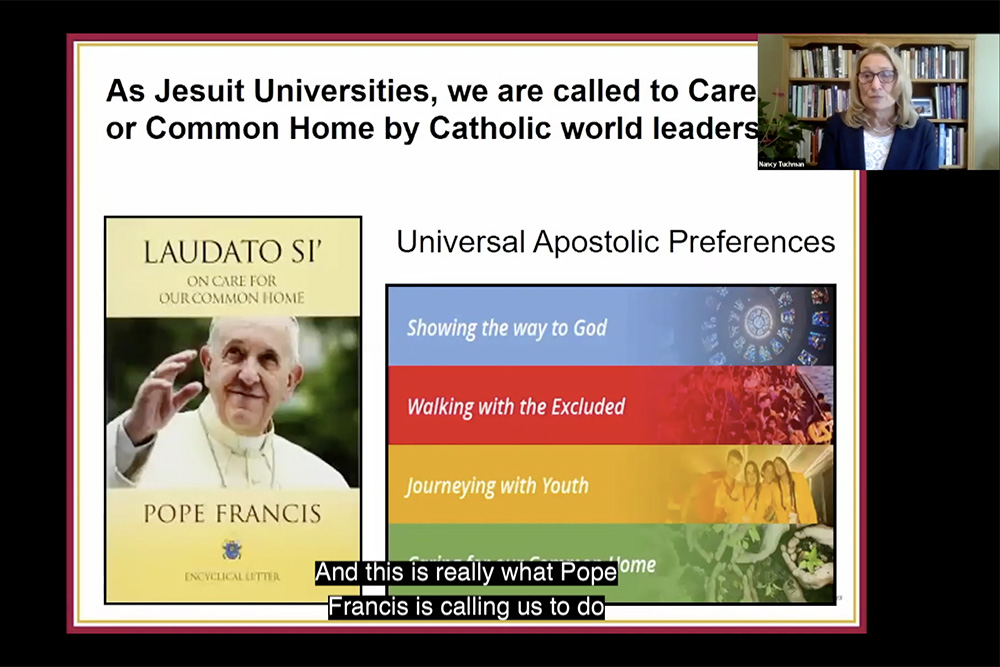
Nancy Tuchman, dean of the School of Environmental Sustainability at Loyola University Chicago, speaks on how Jesuit universities can elevate education and action around environmental justice during the Commitment to Justice in Jesuit Higher Education conference on June 24. (NCR screenshot)
We are witnessing a global campaign of denial, often rooted in the financial interests of extractive industries, a campaign whose epicenter is within the United States. The confrontation between this campaign of disinformation and the growing crisis that the world faces provides for Catholic universities a case study through which the universities can attune students to the concept and nature of objective truth, of its necessity for enduring moral values and substantive moral dialogue and of the danger which its abandonment poses to our culture and our world.
In Laudato Si' Pope Francis fully recognizes that there are widely divergent legitimate opinions on how to move forward to rescue our planet, and that the church does not have the fullness of truth on these issues. "On many concrete questions, the Church has no reason to offer a definitive opinion," he writes. "She knows that honest debate must be encouraged among experts, while respecting divergent views. But we need only take a frank look at the facts to see that our common home is falling into serious disrepair." Fidelity to both competing pathways to the truth and the objective nature of truth should be a mark of every Catholic university. On an issue of searing importance for the young, Laudato Si' can display that fidelity to a new generation.
Integral ecology and the principle of solidarity
Laudato Si' presented to the world the principle of integral ecology, which weaves together essential elements of Catholic social teaching in a new way. Integral ecology arises from the recognition that everything in our universe is interwoven on a profound level. The environment is not merely a physical reality, but the context in which humanity carries out its pilgrimage on this earth.
"When we speak of the 'environment,' " Pope Francis writes,
what we really mean is a relationship existing between nature and the society which lives in it. Nature cannot be regarded as a mere setting in which we live. … We are faced not with two separate crises, one environmental and the other social, but rather one complex crisis which is both social and environmental. Strategies for a solution demand an integrated approach to combating poverty, restoring dignity to the excluded, and at the same time protecting nature.
The effects of the destruction we are visiting upon our common home, as well as the very strategies that are proposed for alleviating the current environmental crisis, impact dramatically access to food and water, housing and meaningful work for billions across the globe.
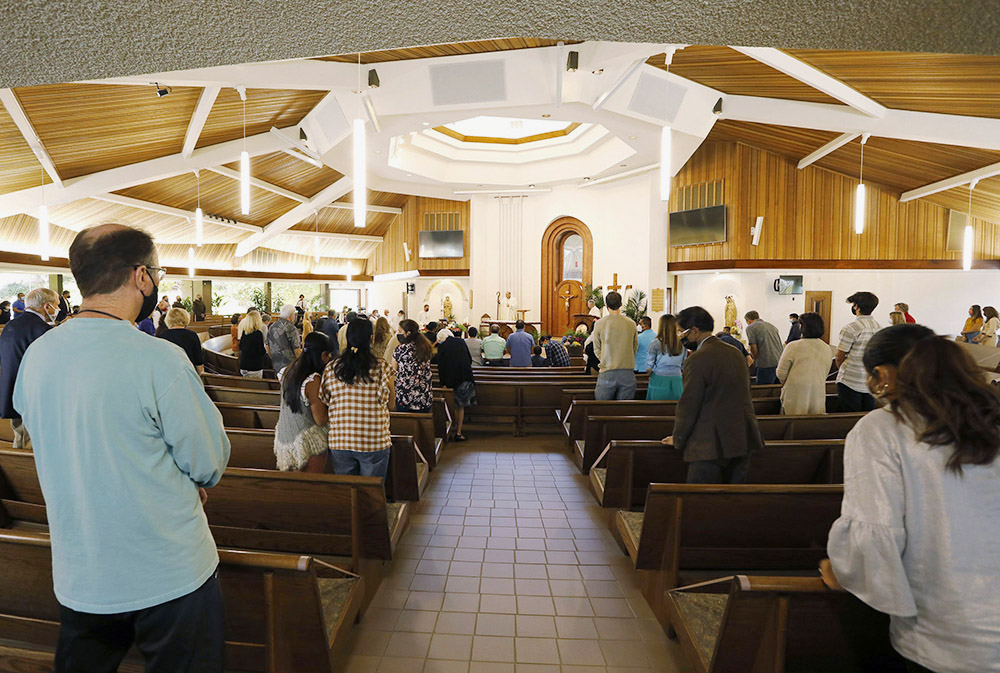
Bishop Robert McElroy of San Diego celebrates a bilingual Mass for Earth Week at St. James Church in Solana Beach, California, April 17, 2021. The San Diego Diocese has divested its financial holdings from the fossil fuel industry, the first Catholic diocese in the United States to make public such a move.
(CNS/The Southern Cross/John Gastaldo)
And the dislocations and misery generated by our destruction of the environment are visited in a grotesquely disproportionate manner upon those who are already destitute and marginalized. Moreover, the degradation of the environment destroys the cultures and institutions that give meaning to human life. Families are weakened and broken up when millions become climate refugees and are forced to leave behind the villages and regions that nurtured their way of life. The dislocations of climate change and environmental destruction accelerate the victimization of those marginalized in our world: the poor, the sick, the disabled, the unborn, racial and ethnic minorities, women.
In the words of Laudato Si', "in the present condition of global society, where injustices abound and growing numbers of people are deprived of basic human rights and become expendable. … (there arises) a summons to solidarity and a preferential option for the poorest of our brothers and sisters."
Every Catholic university should be concerned with the central moral question about technology that Laudato Si' raises for us.
It is in this interweaving of the cry of the earth and the cry of the poor that the integral ecology of Laudato Si' offers the Catholic university a riveting opportunity to present to its community the meaning of the principle of solidarity. Solidarity, in Catholic teaching, is simply the recognition that each of us is deeply graced in this world, and from that grace arises the understanding that we stand in debt to the society that has nurtured us, especially in safeguarding the well-being of the poor and the marginalized. Generating that sense of solidarity, should be at the very heart of every Catholic university. The created order which is the foundation for all the riches that exist in our world is the legacy of all, equally bestowed by our God. Solidarity is the essential element for creating any just social order and public law in our midst.
One dimension of solidarity that Laudato Si' speaks particularly powerfully to is that of intergenerational solidarity. Pope Francis writes:
We can no longer speak of sustainable development apart from intergenerational solidarity. Once we start to think about the kind of world we are leaving to future generations, we look at things differently; we realize that the world is a gift which we have freely received and must share with others. Since the world has been given to us, we can no longer view reality in a purely utilitarian way, in which efficiency and productivity are entirely geared to our individual benefit. Intergenerational solidarity is not optional, but rather a basic question of justice, since the world we have received also belongs to those who will follow us. The Portuguese bishops have called upon us to acknowledge this obligation of justice: "The environment is part of a logic of receptivity. It is on loan to each generation, which must then hand it on to the next."
In the United States the issue of intergenerational solidarity is not confined to environmental questions. It constitutes a fissure in our fundamental societal fabric as we wrestle with so many issues of debt and taxes and support for families. Creating meaningful space within university life for this neuralgic question in the light of the Catholic understanding of solidarity would be a great service to our students and to our nation.
Advertisement
The moral dimensions of technology
We live in an age in which technology has altered our world in a way not seen since the Industrial Revolution. The benefits of this technological revolution are monumental in the fields of health, education, commerce, information and communications.
Yet we also live in an age when technology has generated the threat of global destruction through nuclear war and accelerating environmental degradation.
Many of our Catholic universities have contributed substantially to the technological advances that have enriched our lives.
But every Catholic university should be concerned with the central moral question about technology that Laudato Si' raises for us: the question of how to shape moral norms that can encourage the benefits of technological progress while ensuring that the dignity of the human person and the common good of society are not endangered.
Pope Francis speaks of this dilemma in these words:
The specialization which belongs to technology makes it difficult to see the larger picture. The fragmentation of knowledge proves helpful for concrete applications, and yet it often leads to a loss of appreciation for the whole, for the relationships between things, and for the broader horizon, which then becomes irrelevant.
One of the greatest challenges we face as a nation and as a world is to provide this broader horizon in order to frame moral thinking about the contours of technology. We must bring to our society as a whole an understanding of the risks and benefits we face in a world where the speed and scope of technological innovation will only increase. Our Catholic universities can be a vital part of that conversation, and of the conversation about norms and structures that is currently taking place in government and in business.
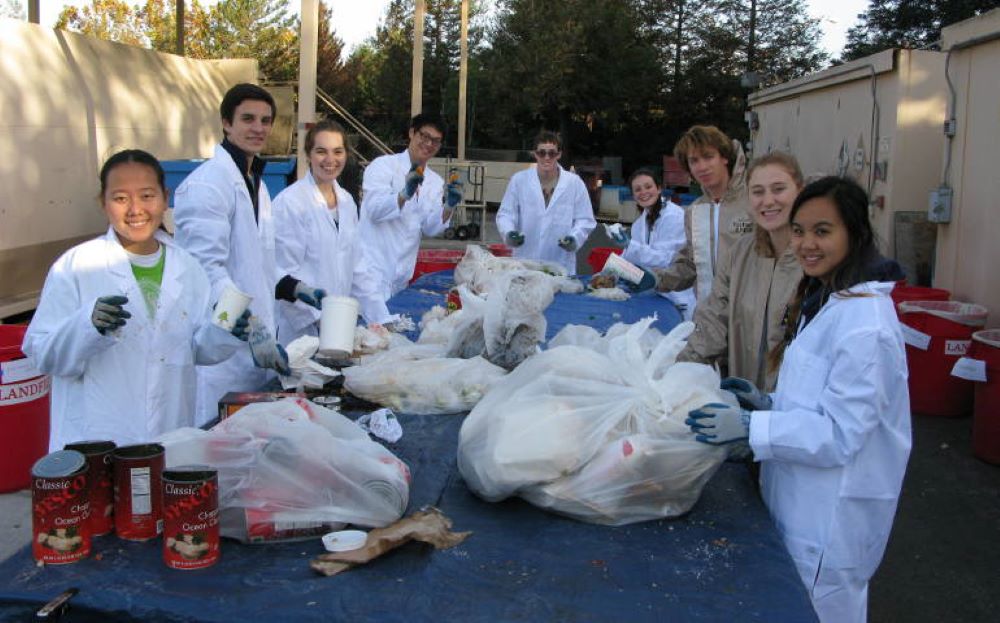
Santa Clara University students in November 2014 participate in a quarterly "waste characterization" session at a campus recycling center to get a better understanding of recycling and composting. Since 2004, Santa Clara has ramped up sustainability efforts on the Jesuit campus. (Santa Clara University)
Conclusion
Laudato Si' is often viewed primarily as a powerful moral challenge to the world to reverse the accelerating destruction of the earth. It certainly is that, but it is so much more.
Laudato Si' is a call to see the interconnectedness in all of creation, and to see in the universe the magnificent act of a loving God. It is a call to understand that objective truth is under assault in debates on climate change. Laudato Si' unites the moral imperative to save our planet with the moral imperative to protect the poor and the marginalized at all times. It points to the searing ethical issues regarding technology that our society ignores at its peril. Finally, Laudato Si' calls us to integrate in our society a truly intergenerational ethic, which can guide us through many of the most divisive issues we face as a nation.
For all these reasons, Laudato Si' constitutes an important pillar for identity and mission for the Catholic university in our day. Truly, Laudato Si' can help light the way forward.







